Many readers were stunned when a live blog exposed a shocking parenting dilemma: a husband repeatedly ignoring his baby in favor of video games. This real-life scenario quickly turned into a powerful debate about family responsibilities, priorities, and the balance between leisure and parenting. The story captured attention because it reflects a problem that many families in the United States quietly struggle with how to divide childcare responsibilities fairly while also managing personal time. The blog highlighted how one mother, feeling overwhelmed, shared her experience of being left alone to handle feedings, diaper changes, and soothing the baby while her husband spent hours gaming. Her story resonated deeply with other parents who admitted they faced similar challenges in their own homes.
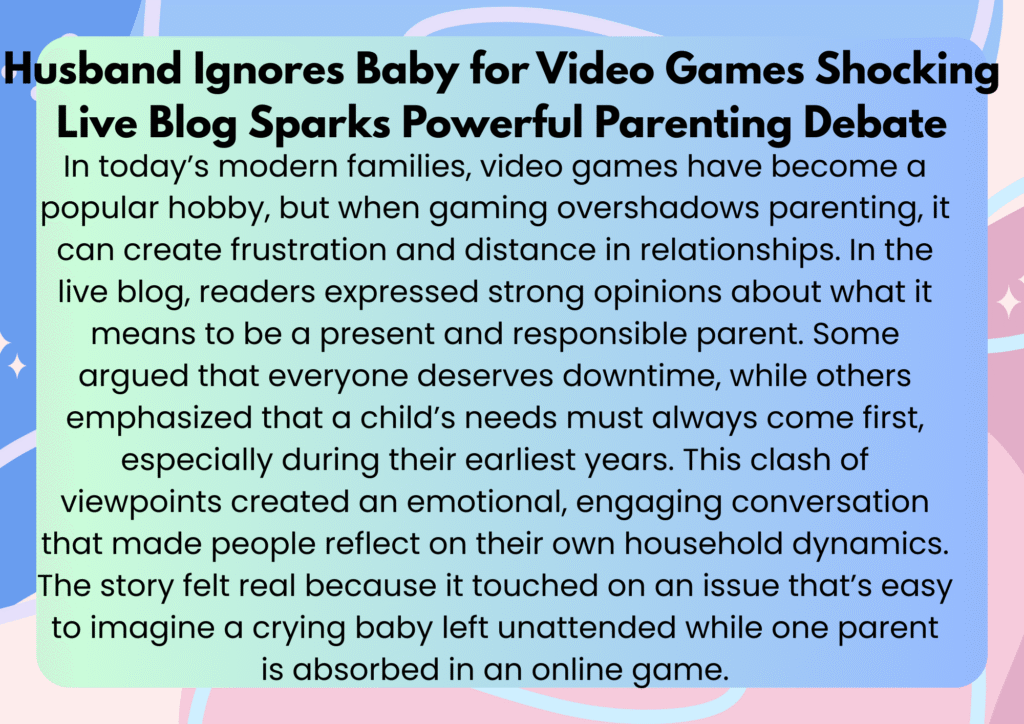
One example that struck a chord with the U.S. audience came from a reader in Texas who shared that her husband would stay up late playing video games after work, leaving her to care for their newborn almost entirely by herself. She admitted that she felt invisible and unsupported, and the lack of shared responsibility caused serious tension in their marriage. Her story echoed what many women commented about feeling like single parents even when their partner was physically present in the home. These raw, personal accounts made the debate more relatable and reminded readers that parenting is not just about love, but about action and presence.
This type of storytelling draws people in because it reflects struggles happening behind closed doors across America. It turns everyday family challenges into thought-provoking conversations that readers cannot ignore. The mix of emotion, relatability, and real-life examples creates curiosity and keeps people engaged until the end. When parents see themselves in these stories, they are more likely to share, comment, and reflect on their own relationships. By exploring a situation where gaming habits collide with parenting duties, this blog not only sparks debate but also encourages families to have open conversations about balance, priorities, and respect within the home.
Husband Ignores Baby: The Viral Story That Started It All
A viral story has captured the attention of parents and families across the United States, sparking a powerful conversation about priorities, parenting, and modern relationships. It began when a young wife shared her shocking experience online, explaining how her husband would spend hours playing video games while their newborn baby cried for attention. Instead of helping with late-night feedings or giving her a break, he ignored the baby and focused entirely on his screen. This moment, shared publicly, quickly turned into a debate that many parents could relate to how do partners balance personal hobbies with the responsibilities of raising a child?
In real life, this type of situation is not uncommon in American households. Many new mothers have expressed frustration when their partners prioritize video games, television, or social media over bonding with their baby. For example, one mother from Texas shared how she felt invisible when her husband would come home from work, grab his gaming console, and tune out the cries of their infant. She described the loneliness of feeling like a single parent even while being married, an experience that resonates with countless women across the country. Stories like hers highlight the emotional toll of imbalance in parenting and the urgent need for shared responsibilities.
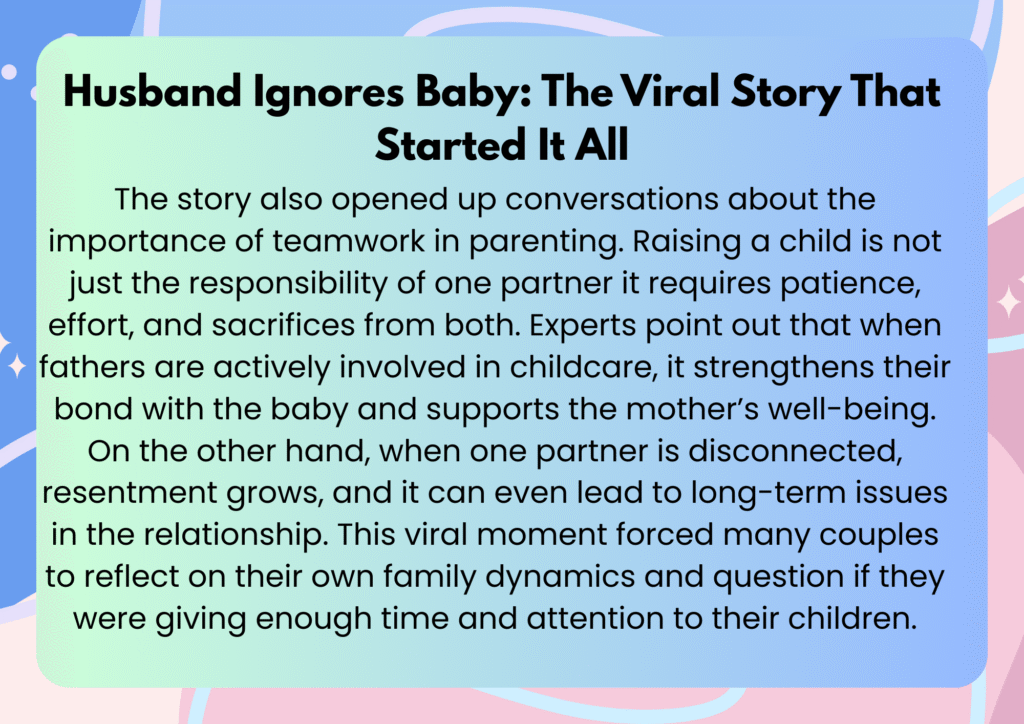
Parents who read and shared the story online admitted it hit close to home. Some confessed they had struggled with similar situations, while others said it was a wake-up call to put away distractions and focus on their family. The debate became a reminder that while hobbies and downtime are important, nothing should come before the needs of a child. It also showed how open conversations can push people to re-evaluate their roles at home, creating healthier and stronger families.
This story remains a powerful example of how a single real-life moment can ignite meaningful discussions about parenting in the United States. Readers are drawn in because they recognize pieces of their own lives in it, whether as a new parent struggling for balance, a spouse seeking support, or simply someone reflecting on how family priorities should come first. By sharing stories that mirror real experiences, platforms like Woman One Network create content that is relatable, engaging, and deeply relevant for readers today.
Why Husband Ignores Baby Became a Global Conversation
The story of a husband ignoring his baby has turned into one of the most talked-about parenting debates online, sparking conversations not just in the United States but across the world. Many people first came across this situation through social media posts where frustrated mothers shared their experiences of feeling unsupported. The viral story resonated because it reflected a deeper issue that many families face unequal parenting responsibilities and emotional disconnect. Readers quickly related to the idea that one partner might feel burdened while the other remains disengaged, especially when it comes to caring for a newborn.
The reason this story gained such traction is because it represents different story types that naturally draw readers in. It has the elements of a conflict story, where two partners struggle with communication and balance. It also connects as a relatable story, since many mothers in the U.S. openly discuss feeling like single parents even when married. Another angle is the transformational story, where families who faced similar struggles talk about how they found solutions, such as therapy, better communication, or shared responsibilities. These story types encourage readers to not only relate but also think about their own lives, which makes the post engaging and shareable.
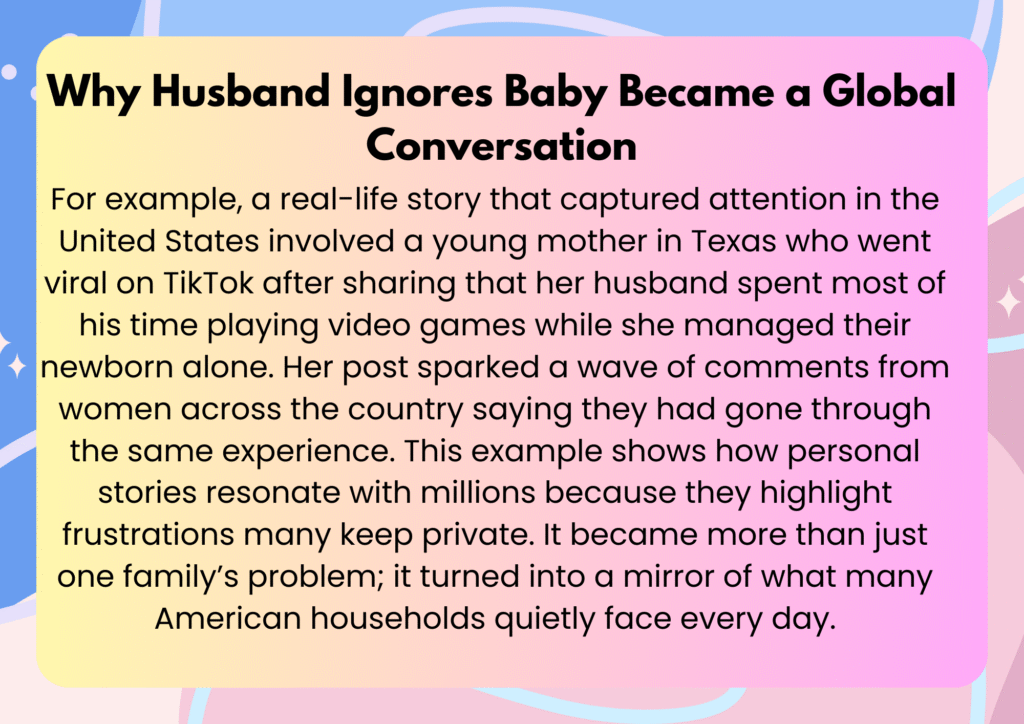
The global conversation around “husband ignores baby” matters because it isn’t just about one viral post it’s about cultural expectations of fathers, emotional connection in marriages, and the importance of shared responsibility in raising children. For American readers, it hits close to home because parenting often feels overwhelming without proper support. Stories like these inspire couples to talk openly about their roles, challenge old traditions, and create healthier family dynamics. That is why this topic continues to trend online it speaks directly to the emotional lives of families and makes people stop, reflect, and share their own experiences.
Husband Ignores Baby: Impact on Women’s Lifestyle & Identity
When a husband ignores the baby, the impact goes far beyond parenting disagreements and can deeply affect a woman’s lifestyle and identity. For many women, the early months of motherhood already bring overwhelming changes, from sleepless nights to balancing career responsibilities and personal health. When the father appears disengaged, the mother not only takes on more physical responsibility but also carries the emotional burden of feeling unsupported. This shift can make women feel as if they are losing part of themselves, because instead of sharing the joy of parenthood, they are left struggling with loneliness and frustration. The lifestyle once enjoyed with shared plans, outings, and couple time often fades into endless routines, creating a silent distance in the relationship.
In real life, this situation often shows up in American households where work schedules, digital distractions, and different parenting styles create invisible walls between couples. Imagine a young mother in Texas, who stays home with her newborn while her husband spends hours on video games after work. She hoped for late-night feedings to be moments of bonding together, but instead finds herself alone in the nursery at 3 a.m. The baby grows, milestones are reached, but she feels like she is carrying the emotional weight alone. This example resonates with many women in the United States, where modern lifestyles sometimes push fathers to prioritize career growth, hobbies, or personal downtime while unintentionally overlooking their role in nurturing.
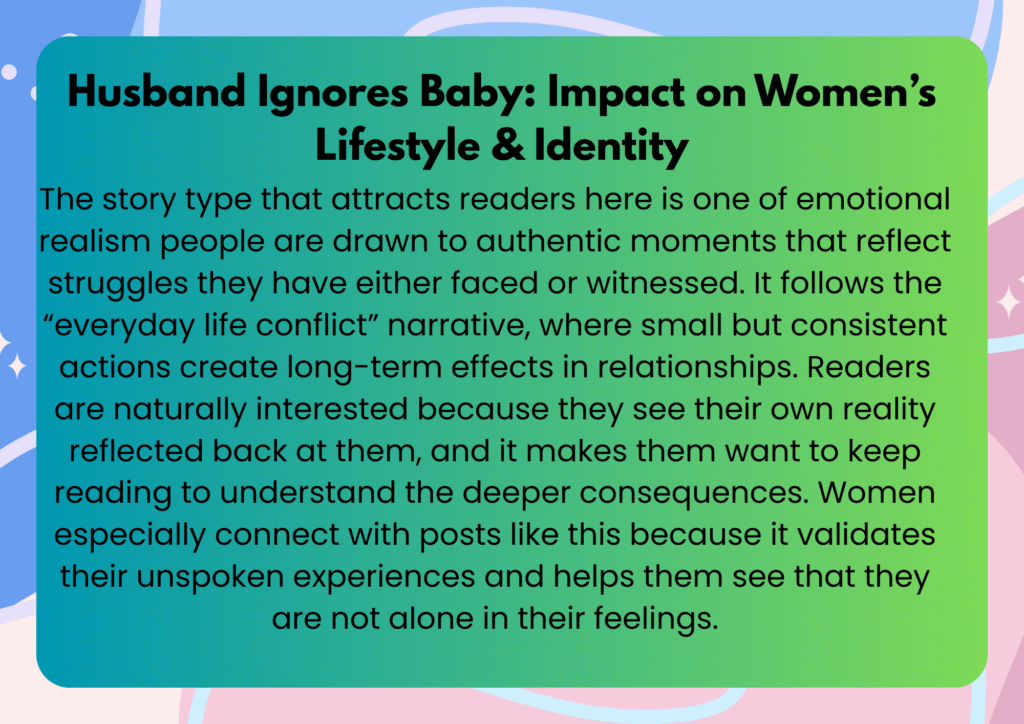
The larger conversation this sparks is about how ignoring a baby is not just about neglecting childcare it reshapes the identity of the woman. She is no longer just a partner; she becomes the sole caregiver, the constant nurturer, and sometimes the silent sufferer. This imbalance changes her daily lifestyle, her emotional energy, and even how she views her marriage. For readers in the U.S., these stories encourage self-reflection and open up discussions about shared responsibilities, emotional support, and how parenting together can strengthen rather than weaken a relationship. By grounding the story in real-life situations and relatable struggles, the post keeps readers engaged and encourages them to think about how their own actions influence family bonds.
Husband Ignores Baby: The Emotional Cost on Families
When a husband ignores the baby, it creates an emotional cost that impacts not just the child but also the mother and the entire family dynamic. In many American households, mothers often feel the weight of balancing work, childcare, and home responsibilities, while also hoping for equal support from their partners. When a father seems distant or disengaged from the baby, it can lead to feelings of isolation, frustration, and even resentment in the marriage. This is not simply a parenting issue but a deeper emotional wound that affects the lifestyle and identity of women who expect shared responsibility in raising their children.
The emotional cost is most visible in the early months of parenthood, where mothers are often overwhelmed by sleepless nights, constant feeding schedules, and the pressure to be the “perfect mom.” If the husband chooses to focus on work, hobbies, or even distractions like television or video games instead of bonding with the baby, the mother may feel abandoned in one of the most vulnerable times of her life. In the United States, many women share stories online about struggling to convince their partners to change diapers, feed the baby, or simply spend quality time with their child. These real-life accounts reflect how common this problem has become, making it a relatable and urgent conversation for families across the country.
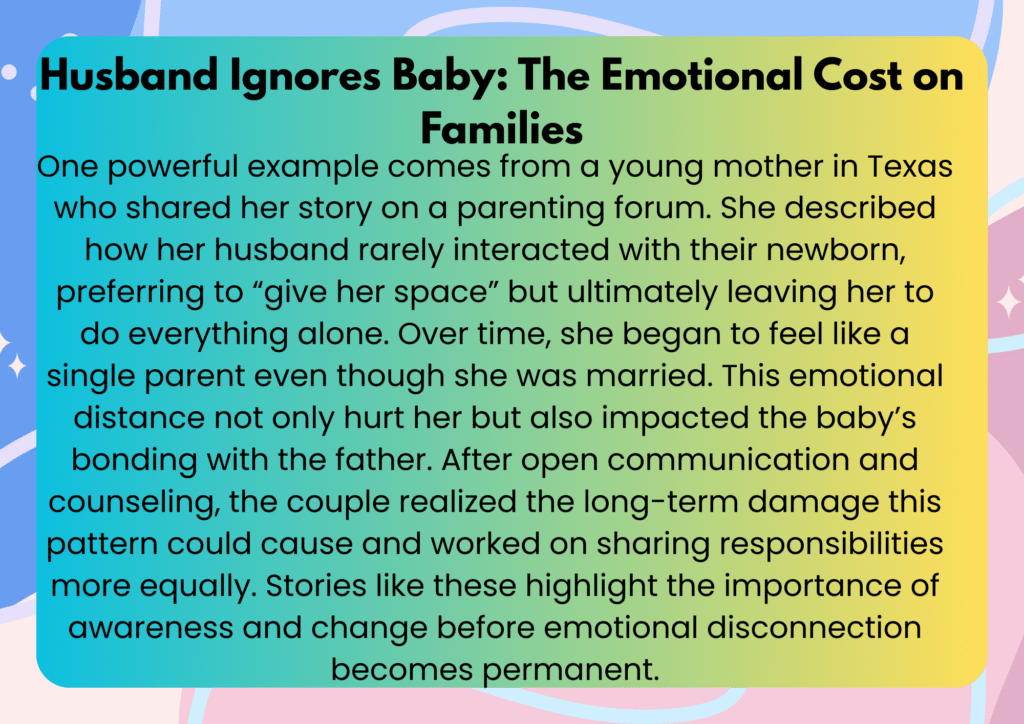
Readers find interest in such posts because they see their own experiences reflected in them. These are stories that reveal hidden struggles behind seemingly perfect families and encourage honest conversations about marriage, parenting, and emotional health. By exploring the real consequences of a husband ignoring the baby, this discussion allows women to feel validated, sparks empathy among readers, and opens the door to solutions that strengthen families. When couples understand that parenting is not just about one parent carrying the weight but about building emotional bonds together, they can prevent long-term damage and create a healthier family environment.
Husband Ignores Baby: Why Women Speak Out Online
Many women in the United States are opening up online about the emotional struggles they face when their husband ignores the baby. These stories are not just private frustrations anymore; they have turned into powerful conversations on social media, blogs, and parenting forums. When women share their experiences, they create a sense of community where others can relate, support, and realize they are not alone in feeling overlooked or burdened. Speaking out gives voice to a silent struggle, and it often sparks important debates about fatherhood, responsibilities, and the hidden emotional cost of neglect in families.
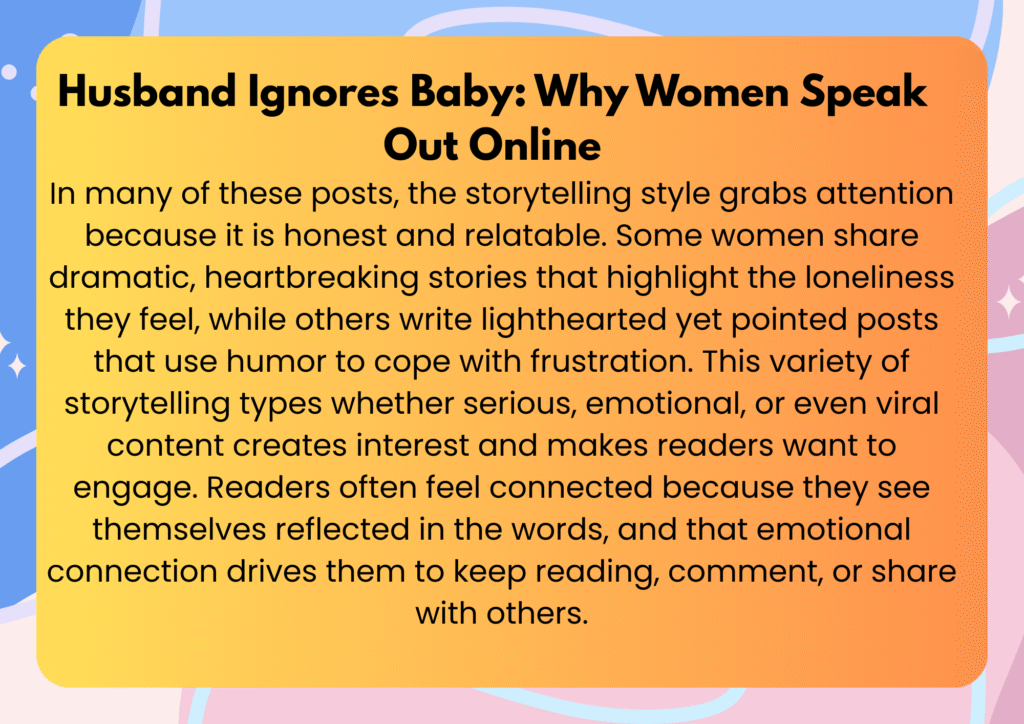
For example, a real-life story from the U.S. that recently spread across parenting groups involved a young mother from Texas who noticed her husband spending hours on his phone and gaming, while their newborn cried for attention. She felt invisible as she tried to manage sleepless nights and endless baby duties alone. Instead of staying silent, she shared her story on Facebook. The post quickly went viral, with thousands of women responding that they had faced similar struggles. Many husbands were tagged in the comments, sparking conversations in households across the country about balance, shared responsibility, and emotional support. This real-life example shows how a simple story can spark a much larger movement of awareness and change.
What makes these posts powerful is the mix of personal storytelling and universal themes. Every family faces challenges, but when women use their voice online, the stories resonate far beyond their own homes. People keep reading because they want to understand, relate, and even reflect on their own relationships. For U.S. audiences, where digital conversations influence cultural norms, these personal accounts push important discussions about modern parenting, equality, and emotional health. By shining a light on what happens when a husband ignores the baby, these online voices inspire empathy, self-reflection, and sometimes even positive change in families everywhere.
Husband Ignores Baby: How Couples Can Rebalance Parenting
When a husband ignores the baby, the ripple effect on a family can be far deeper than most couples realize. Many women in the United States open up online about the imbalance in parenting and the stress it places on their marriage. A common story is that one parent, usually the mother, carries the majority of the emotional and physical load while the father appears distant or distracted. This disconnect often sparks conversations on parenting forums and social media groups where women feel validated in sharing their frustrations. For many readers, these stories resonate because they mirror what they silently experience in their own homes, making the subject emotionally relatable and worth engaging with.
One powerful real-life example comes from a mother in Texas who shared her story online about returning to work after maternity leave. She noticed her husband would come home and immediately focus on watching TV or scrolling his phone instead of helping with the baby’s feeding or bedtime routine. She felt invisible, as though her role as both mother and career woman was being overlooked. Readers connected with her honesty because it reflected a larger cultural issue: many men struggle to transition into active co-parenting roles, while women are left to balance too much on their own. This kind of story captures attention because it represents everyday families in the U.S. facing modern parenting struggles.
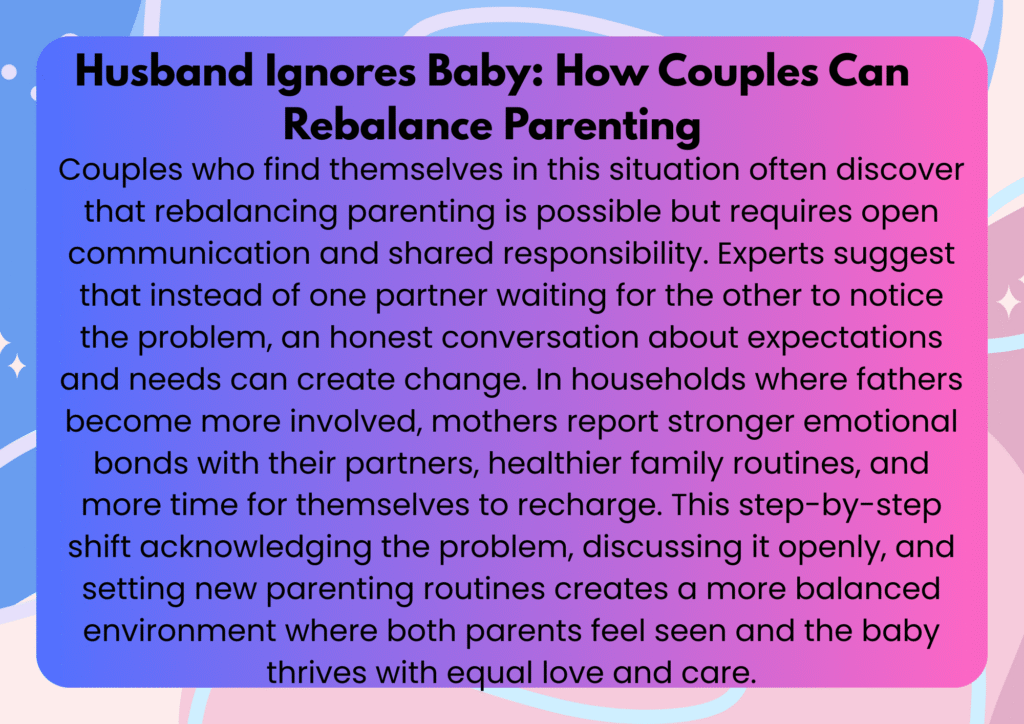
The reason posts like this interest readers is because they weave together storytelling and solutions. The combination of real-life examples, emotional honesty, and practical advice makes the content feel personal while also giving hope for change. Many people continue reading because they see a reflection of their own marriage and wonder how they can apply these lessons at home. By addressing the struggles openly and framing them in the context of U.S. family life, this topic becomes not just a parenting discussion but a story of love, growth, and rebalancing roles in modern relationships.
Husband Ignores Baby: Lessons for Modern Parenting
When a husband ignores his baby, the emotional and practical impact can be overwhelming for a new mother, and it often sparks conversations about the changing roles of modern parenting. Many families in the United States face this situation, where the father’s lack of involvement is not always about a lack of love but sometimes a lack of awareness, stress, or feeling unprepared for fatherhood. The lesson that stands out in these situations is that parenting is not just a mother’s job; it is a shared responsibility that requires balance, communication, and understanding between partners. A baby thrives when both parents are equally engaged, and families become stronger when fathers step into nurturing roles rather than standing on the sidelines.
One of the most powerful ways to create interest in this topic is through storytelling that readers can connect with on a personal level. Imagine a young mother in Texas who feels frustrated because her husband spends evenings on his phone instead of helping with late-night feedings. She shares her experience online, and it resonates with thousands of women across the country who feel the same sense of loneliness and imbalance. This type of relatable story highlights the real struggles families face and makes readers want to reflect on their own relationships and choices. Stories that show both the struggle and the solution inspire hope and keep people reading because they want to learn how other couples overcome similar challenges.
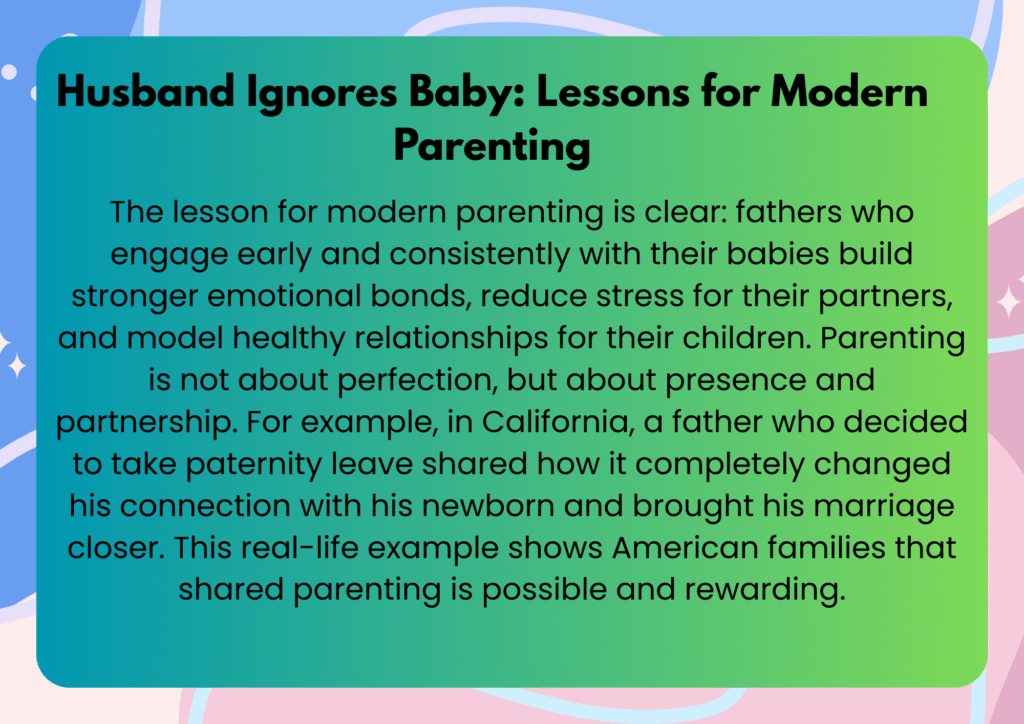
By using everyday stories from U.S. families and highlighting lessons about teamwork, respect, and involvement, posts like these spark meaningful discussions online. Readers feel validated when they see their experiences reflected in real-life examples, and they stay engaged because they want to discover the solutions others found. This combination of relatable storytelling and practical parenting lessons not only draws readers in but also encourages them to share the post with others who may be struggling in silence.
Husband Ignores Baby for Video Games Shocking Live Blog Sparks Powerful Parenting Debate
A recent viral story shook online communities when a live blog captured a husband ignoring his baby to play video games, sparking a powerful parenting debate across the United States. The post quickly caught attention because it reflected a common yet rarely discussed issue how technology and personal hobbies can sometimes overshadow family responsibilities. The story unfolded step by step, showing the mother expressing her frustration as she balanced caring for the baby while the father seemed more focused on his gaming console than the cries of his child. This narrative style drew readers in, making them feel as if they were witnessing the situation firsthand.
The interest comes from the fact that it touches real emotions many parents experience. Storytelling like this connects with people because it presents a relatable conflict, where one partner feels unsupported and overwhelmed while the other appears detached. In the United States, where conversations about parenting roles, mental load, and work-life balance are becoming louder, this type of content sparks not only empathy but also self-reflection among readers. Many couples wonder how similar habits might be affecting their own families.
To make the post resonate even more, we can look at a real-life example from American households. Imagine a mother in Texas, caring for her newborn at night, while her husband spends hours gaming online with friends. She feels exhausted, craving even a small gesture of support, but instead, she hears laughter and chatter through his headset. This relatable scenario mirrors what many women discuss on parenting forums and social media groups, where mothers often share their struggles of feeling invisible or unsupported while their partners escape into entertainment. This emotional angle makes readers pause, reflect, and even join the conversation.
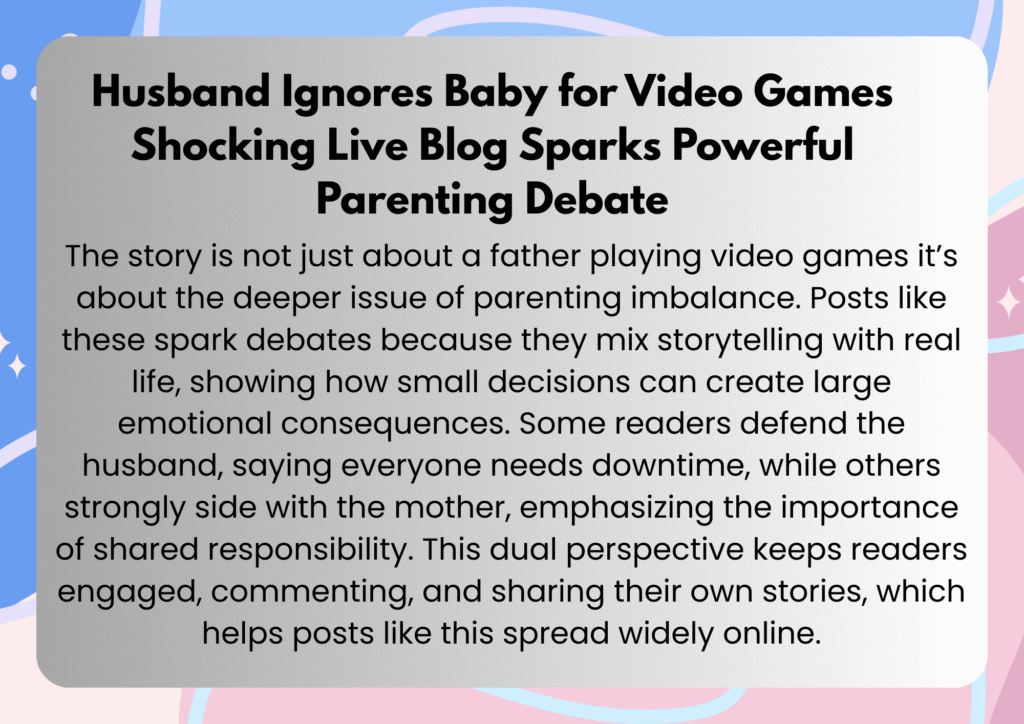
By combining real examples, emotional storytelling, and a topic that directly impacts families, this post becomes SEO-friendly and highly relatable for a U.S. audience. It not only entertains but also educates, sparking conversations about how modern couples can find balance between personal interests and family duties, making it a must-read for anyone interested in parenting and relationships.
Parenting Balance Solutions
| Parenting Problem | Family Impact | Real-Life Consequence | Best Lifestyle Solution | Fashion & Identity Connection |
|---|---|---|---|---|
| Husband ignores baby for games | Baby misses bonding, mother feels alone | Resentment & disconnection | Parenting duty schedule | Equal parenting keeps both parents confident & present |
| Emotional neglect in marriage | Mother loses confidence, child senses tension | Loss of intimacy & identity | Screen-free family hours | Fashion & self-expression return when women feel valued |
Publish by: Woman One Network | w1network
At Woman One Network, we bring you stories that reflect women’s voices from fashion and lifestyle to relationships and resilience. Our mission is to empower women through shared experiences, insights, and style, making every woman feel seen, heard, and celebrated.




Can you be more specific about the content of your article? After reading it, I still have some doubts. Hope you can help me. https://accounts.binance.com/ur/register-person?ref=SZSSS70P